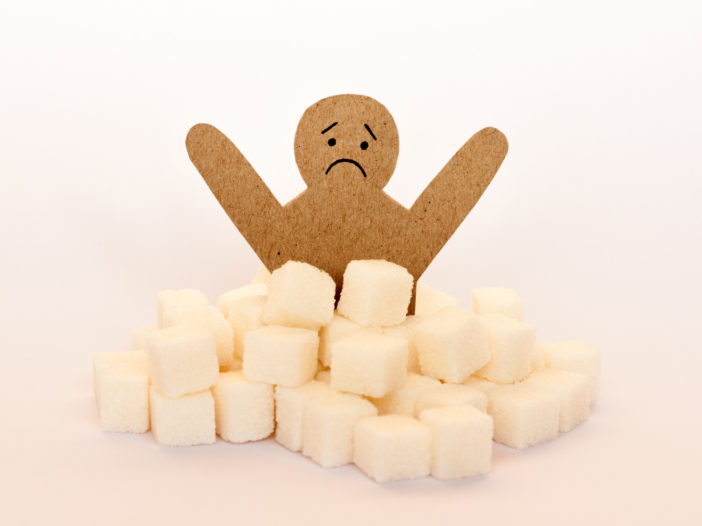
“Going through the menopause” is marked by some pretty big hormonal shifts.
Levels of oestrogen fluctuate and eventually decline and as this happens, you can experience a whole raft of symptoms like PMS, palpitations, migraines, hot flushes, dryness, insomnia and anxiety.
But what many people do not realise, or focus on, is this: Many many other major hormones are having a negative impact on your health during this time of change. And that these other hormones may be contributing to menopause symptoms.
And one of the main ones which is often overlooked is insulin.
So, what is the connection between insulin and the menopause?
Insulin is released from your pancreas when you eat sugar and carbohydrates. Its job is to regulate blood sugar. It captures any sugar that enters the body. And then passes it to the liver to be used as energy or stored. This is all well and good.
But when it comes to insulin and the menopause, there are two things to be mindful of:
Firstly, the hormone oestrogen affects how your body responds to insulin.
Oestrogen helps to optimise insulin. And so, before the menopause when your ovaries are producing good levels of oestrogen, moving glucose out of the blood into the cells tends to work pretty effectively. However, this disadvantage disappears with the menopause and levels of oestrogen drop away.
Secondly, many menopausal women are eating a typical western diet, high in sugars and refined carbohydrates. And even if they are not and their diet is pretty healthy, the following can happen: As women age, it becomes more difficult to tolerate and process sugar/ refined carbohydrates.
And so, with a combination of:
A) a typical western diet
B) increased age
C) a drop in oestrogen
It is quite common for many menopausal women to become insulin resistant.
When this happens, you lose your sensitivity to insulin. Your body cannot cope with all the carbs and sugar coming in. And it tries to deal with it by producing more insulin. Eventually blood sugar levels increase. At this point you struggle to manage carbohydrates in your diet. And symptoms such as weight gain, lethargy, difficulty concentrating, sugar crashes and cravings start to emerge.
These are often the first symptoms menopausal women experience. And they don’t always make the connection that they are quite possibly linked to insulin resistance and a lack of blood sugar control.
But it isn’t just menopause symptoms which are a cause for concern. On top of this, chronically high levels of insulin can increase your risk of serious conditions such as diabetes, inflammation, high blood pressure and high cholesterol.
The good news is this. You can reduce and reverse insulin resistance with the right diet and lifestyle approach:
Focus on getting a good night’s sleep
For many women, sleep becomes difficult during the menopause. And this isn’t great, because when you don’t get a good night’s sleep, it can also impact how well you manage your blood sugars. If you are not sleeping well, your body can produce more cortisol. Cortisol provides your body with glucose and can therefore increase blood sugar levels too. So, it’s important to achieve good quality sleep. Take a read of my blog here:
Focus on balancing your blood sugars
One of the quickest ways to reverse insulin resistance and the issues which it causes is to focus on your diet. Avoid sugar and simple carbohydrates. This will stop you pumping more glucose into your body. And as a result, it will help you to lose weight and control your blood sugars. To keep insulin balanced, choose lean meats and other proteins along with lots of vegetables and healthy fats . Good examples are avocados, salmon, flax seeds and eggs.
Try overnight fasting and try not to snack in between meals. This will also help to balance out your blood sugars.
Get out and exercise
Stay active. By moving your body and exercising regularly, your body will become more efficient at using insulin.
Control stress levels
Your stress hormone cortisol releases glucose to give you fuel to deal with the danger/stress in your life. This is fine in the short term, but if you have continually high levels, then your glucose levels remain high which can increase insulin resistance.
It is therefore important to find time daily to de stress. This could be a little yoga, walk or meditation. Even learning some deep breathing exercises can really help to reduce cortisol levels.
Seek guidance regarding supplements
Certain supplements help increase insulin sensitivity.
These include berberine, chromium and alpha lipoic acid. Seek professional guidance for help in choosing a quality product and dose which is right for you.
So, you can see that even a few changes to your diet and lifestyle can make a real difference. It can certainly help to reduce some of the symptoms which you may be struggling with right now. If you would like to understand a little bit more about the impact of hormones on your menopause, then do drop me a line. I would love to help.
